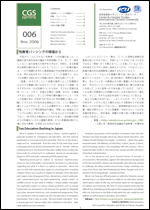Yukihiro MURASE, Representative, The Council for Education and Study on Human Sexuality
All of a sudden, a councilor brings a citizen’s protest against a paticular incident of ‘outrageous sex education’ into the national parliament or a local government assembly. Then, he or she draws a reply such as ‘undesirable’ from the chair. At the same time, some newspaper posts an article presenting the case as ‘terrible’ without verifying the facts. The Board of Education swiftly moves to keep the issue under its control. Such 'co-ordinated’ attacks on sex education began in 2002 and have continued until the present day.
Repeating words such as ‘radical’ or ‘excessive’ imprints only a sense of crisis in the public consciousness, but there is no discussion regarding just what it is that is so radical or excessive – about the use of a doll with reproductive organs as a teaching aid or teaching children names such as penis or vagina, for example. Terms like penis and vagina have disappeared from elementary school textbooks, and ‘sexual intercourse’ has been replaced by ‘sexual contact’ in middle schools. So just what is children’s sexual reality? Teenagers are especially subject to various sexual problems such as sexual harassment via cell phones or the internet, the spread of Chlamydia and other venereal infections, and unexpected pregnancies. They are caused not only by adults but also the ignorance of teenagers themselves. That is why accurate ‘life and health education’ from a young age and ‘human rights and coexistence education’ after early adolescence are required.
However, proponents of the backlash movement insist that this situation has been brought about by radical sexual education, and children should therefore be taught ‘continence’, rather than given empowerment. The Ministry of Education, Culture, Sports, Science, and Technology seems to be complying with this opinion –this is fundamentally similar to the reactionary sexual morality education of the Bush administration.
Sex is the deepest and most fixated theme in people’s consciousness. Nevertheless, against the international background of the late twentieth century, sex and gender education has started to challenge this deep-rooted consciousness. Today’s bashing is an arises from those who feel threatened by these changes and try to prevent it by inciting people’s anxiety and fear.
We do not have any official powers or authority. However, we are unwavering in our determination to fight for an education system which places value on life, sex, and human rights for the happiness of children and humanity. We wish to work towards achieving this difficult but rewarding goal through active engagement and debate with not only those in the field of education but also medicine and welfare, as well as parents, guardians and citizens.
 The seventh issue of the CGS Newsletter is now available both in print and online. Click the URL to download the PDF version.
The seventh issue of the CGS Newsletter is now available both in print and online. Click the URL to download the PDF version.